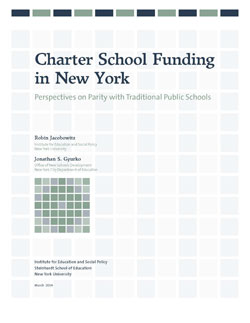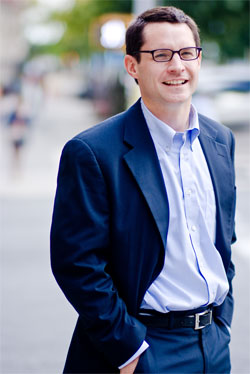Student, Well Seasoned
Plenty of TC students have some field work under their belts—but not too many can claim to have formulated education policy and created schools. Jonathan Gyurko, a doctoral student in Politics and Education, is one, having served as the Director of Charter Schools for the New York City Department of Education (DOE) and currently, as a Special Assistant to Randi Weingarten, President of the United Federation of Teachers (UFT), advising the union on charter school policies and affairs.
Before making his way to DOE, Gyurko taught English and drama to middle and high school students in
Beginning in 2000, Gyurko collaborated on the design and launch of the New York City Charter School Initiative, a five-year $41 million plan to open 50 new charter schools. The initiative was anchored in policies he developed and implemented to establish financial parity between charter and district schools. He also managed the conversion of five public schools to charter status.
In response to concerns about funding disparities, Gyurko co-authored, in 2004, “Charter School Funding in
His charter work under New York City Public School Chancellors Harold Levy and Joel Klein gave Gyurko plenty of opportunity to experience the bureaucratic constraints and political infighting that hamper districts, unions and charter supporters—obstacles that are “causing a stalemate that keeps the good ideas in chartering from moving forward,” he says. He left the DOE and joined the union in part “to help move not just the policies but also the politics forward.”
At the UFT, Gyurko co-founded the UFT Elementary and
Gyurko believes these union-operated schools offer teachers a way to reclaim the charter school movement through educator-led innovation, professionalism and capacity-building. “The charter model can deepen school-based ownership and accountability, while creating opportunities for people from different walks of life to make a meaningful contribution to public education.” he says. “When done right, this is an important model of reform and achievement.”
Gyurko sees himself as a pragmatist and coalition-builder in education reform. He emphasizes that the bottom-up educator leadership permitted in chartering “is not a replacement for public schools but a model for the type of leadership that we need in all of our public schools.”
In fact, it’s the opportunity for partnership that particularly motivates Gyurko, both in his charter school work and in his doctoral research on how language used in the school reform debate—particularly the extremes of combative versus collaborative metaphors—affects reform. “We are trying to break into new understandings of good ideas, to try to put better policies and smarter politics around the ideas, so they can work,” he says of his charter school work at the UFT. “I feel we can’t miss a moment in getting these new understandings out there to engage the debate and move people out of polarized corners into areas of common ground and nuance. That’s very exciting and very driving.”
Published Wednesday, Feb. 13, 2008

